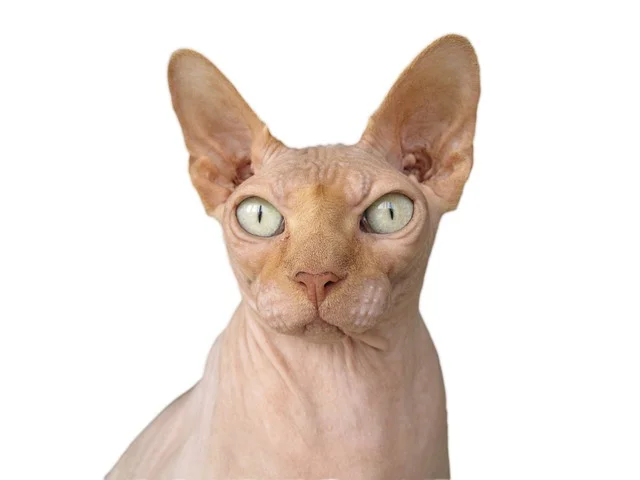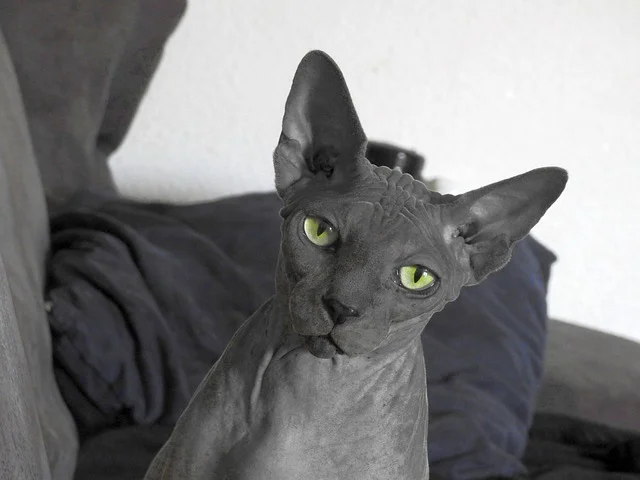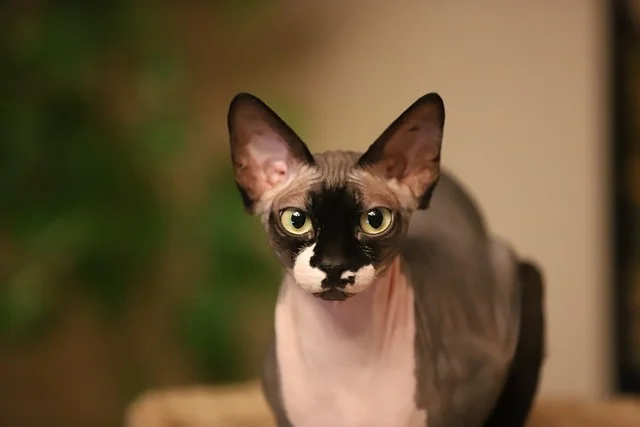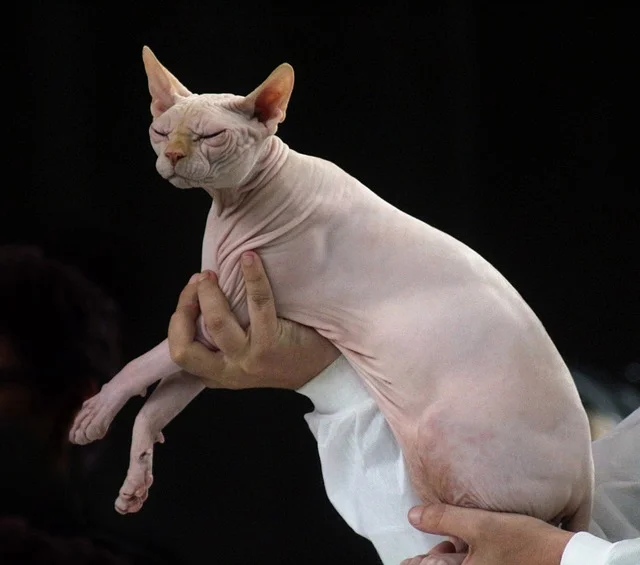If you’re curious about hairless cats, you’re in the right spot! This article will cover everything about them – where they originate, their traits, how to care for them, and more. Whether you want one or just want to know more, we’ve got all the info you need!
Origins of Hairless Cats
Hairless cat breeds have a rich and mysterious history. Contrary to popular belief, they are not the result of recent genetic experiments or human intervention. Their roots can be traced back to ancient civilizations, where they were revered and considered symbols of prestige and good fortune.

The Mexican Hairless Cat
One of the most famous hairless cat breeds is the Mexican Hairless, also known as the Sphynx. These cats were regarded by the Aztecs and Mayans, who believed they possessed mystical powers. Legend has it that the Aztec god Xolotl bestowed these cats upon humanity, making them a precious gift from the gods.

The Canadian Hairless Cat
Another prominent hairless cat breed is the Canadian Hairless, also referred to as the Don Sphynx. Unlike the Mexican Hairless, the Canadian Hairless is a natural mutation that occurred in Toronto, Canada, in the 1960s. A domestic cat named Elizabeth gave birth to a hairless kitten. It marks the beginning of a new breed that would delight cat enthusiasts worldwide.
Bambino Cats
The Bambino cat breed is a relatively new addition to the hairless cat family. Created by crossing Sphynx cats with short-legged Munchkin cats, Bambinos display a captivating combination of hairlessness and small stature. Their short legs and elongated bodies give them an adorable kitten-like appearance, even into adulthood. Bambinos are highly sociable and thrive on companionship, making them an excellent choice for households seeking an affectionate and interactive pet.
Peterbald Cats
Originating in Russia, the Peterbald cat breed boasts a graceful and elegant demeanor. These cats possess varying degrees of hairlessness, ranging from a fine coat of fuzz to being almost completely bald. Their slender bodies and almond-shaped eyes exude an air of sophistication. Peterbalds are known for their intelligence and agility, making them adept at learning tricks and engaging in interactive play. Their charming personalities and stunning looks make them a coveted choice for cat enthusiasts around the globe.
Unveiling the Beauty of Hairless Cat Breeds
Hairless cats may lack fur, but their allure lies in their distinct appearance and endearing qualities. Let’s delve into the fascinating characteristics that make these feline companions truly unique.
Hypoallergenic Marvels
One of the primary reasons people are drawn to hairless cat breeds is their hypoallergenic nature. Many individuals who are allergic to traditional cats find solace in the company of hairless cats. Their lack of fur significantly reduces the presence of allergens, providing a more comfortable living environment for allergy sufferers.
Velvety Soft Skin
Contrary to popular belief, hairless cats are not completely devoid of hair. They possess a thin layer of downy fuzz or a fine coat that gives their skin a velvety texture. This unique feature sets them apart from any other feline companion.
Distinctive Body Structure
Hairless cat breeds have an unmistakable body structure that distinguishes them from their furry counterparts. Their long, graceful bodies are adorned with wrinkled skin, giving them a distinctive and captivating appearance. The absence of fur accentuates their muscular physique and agile movements, further adding to their charm.
Caring for Hairless Cats
Proper care is essential to ensure the health and well-being of hairless cats. Understanding their specific requirements will enable you to provide them with the love and attention they deserve.

Skincare and Sun Protection
Due to their lack of fur, hairless cats require special attention to their skin. Regular skin care routines, including gentle bathing and moisturizing, help maintain their skin’s health and prevent dryness. Additionally, protecting them from prolonged sun exposure is crucial to prevent sunburn. Applying pet-friendly sunscreen and providing shaded areas for outdoor activities are essential measures for their well-being.
Temperature Regulation
Hairless cats are more sensitive to temperature changes compared to their furry counterparts. As they lack the insulation provided by fur, it is important to ensure they remain comfortable in both hot and cold environments. During colder months, providing warm bedding, sweaters, and even heated cat beds can help keep them cozy. On the other hand, in warmer climates, it is vital to keep them cool and well-hydrated to prevent overheating.
Maintaining a Balanced Diet
A nutritious and well-balanced diet is important for the overall health of hairless cats. Their unique metabolism and higher body temperature require a specialized diet that meets their specific nutritional needs. Consult with your veterinarian to determine the ideal diet for your hairless cat, considering factors such as age, weight, and any existing health conditions.
Regular Veterinary Check-ups
Just like any other cat, hairless cats require routine veterinary check-ups to ensure their well-being. Regular examinations, vaccinations, and preventive treatments are essential to keep them healthy and protected against common feline diseases. Additionally, your veterinarian can provide specific guidance on caring for hairless cats and address any concerns or questions you may have.

Debunking Myths: The Truth About Hairless Cats
Hairless cats have garnered their fair share of misconceptions over the years. Let’s debunk some common myths and shed light on the truth behind these fascinating feline companions.
Myth #1: Hairless Cats are Always Hypoallergenic
While it is true that many individuals with allergies find relief in the company of hairless cats, it is not a guarantee that all hairless cats are hypoallergenic. Allergies can vary from person to person, and some individuals may still experience allergic reactions despite the reduced presence of allergens in hairless cats. We always recommend spending time with a hairless cat before determining if you have any allergies.
Myth #2: Hairless Cats Require Less Grooming
Although hairless cats may not require regular brushing or grooming to maintain their coat, they still require proper skincare and occasional bathing. Their skin secretes oils that need to be gently cleaned to prevent build-up. It maintains skin health. Additionally, regular nail trimming, dental care, and ear cleaning are essential aspects of their grooming routine.
Myth #3: Hairless Cats are Prone to Health Issues
Hairless cats are not inherently more prone to health issues compared to other cat breeds. However, their hairlessness does make them susceptible to certain conditions related to their skin and temperature regulation. By providing appropriate care, nutrition, and regular veterinary check-ups, you can help ensure that your hairless cat leads a healthy and fulfilling life.
Conclusion
Hairless cat breeds offer a stunning glimpse into the world of unique and intriguing feline companions. Their enigmatic origins, distinctive appearance, and special care requirements make them a subject of fascination for cat enthusiasts worldwide. By understanding their needs, providing them with appropriate care, and embracing their exceptional qualities, you can forge a rewarding and meaningful bond with a hairless cat that will enrich your life for years to come.
Frequently Asked Questions (FAQs)
Are hairless cats completely bald?
No, hairless cats are not completely bald. They have a thin layer of downy fuzz or a fine coat that gives their skin a velvety texture.
Are hairless cats hypoallergenic?
Hairless cats are commonly seen as hypoallergenic because their furless nature reduces the amount of allergens present. However, allergies can vary among individuals, so it is advisable to spend time with a hairless cat before deciding if you have any allergies.
Do hairless cats require special care?
Yes, hairless cats have specific care requirements. They need skincare and sun protection, temperature regulation, a balanced diet, and regular veterinary check-ups.
Are hairless cats prone to health issues?
Hairless cats are not inherently more prone to health issues compared to other cat breeds. However, their hairlessness makes them susceptible to certain conditions related to their skin and temperature regulation.







Leave a Comment
You must be logged in to post a comment.